-
 Bitcoin
Bitcoin $84,303.0786
0.72% -
 Ethereum
Ethereum $1,824.0570
0.33% -
 Tether USDt
Tether USDt $0.9998
-0.01% -
 XRP
XRP $2.0874
2.05% -
 BNB
BNB $597.8738
-0.33% -
 Solana
Solana $118.8333
0.40% -
 USDC
USDC $1.0000
0.00% -
 Dogecoin
Dogecoin $0.1667
1.66% -
 Cardano
Cardano $0.6588
1.16% -
 TRON
TRON $0.2390
2.38% -
 Toncoin
Toncoin $3.5373
-4.78% -
 UNUS SED LEO
UNUS SED LEO $9.3604
-0.66% -
 Chainlink
Chainlink $13.0744
0.75% -
 Stellar
Stellar $0.2630
0.86% -
 Avalanche
Avalanche $18.5330
0.97% -
 Sui
Sui $2.2611
-1.82% -
 Shiba Inu
Shiba Inu $0.0...01240
0.76% -
 Hedera
Hedera $0.1648
1.17% -
 Polkadot
Polkadot $4.1054
2.64% -
 Litecoin
Litecoin $84.7040
0.39% -
 Bitcoin Cash
Bitcoin Cash $308.6873
0.94% -
 MANTRA
MANTRA $6.3103
-0.69% -
 Bitget Token
Bitget Token $4.5571
-0.22% -
 Dai
Dai $1.0001
0.01% -
 Ethena USDe
Ethena USDe $0.9996
-0.02% -
 Monero
Monero $217.3032
2.54% -
 Hyperliquid
Hyperliquid $11.8474
0.49% -
 Uniswap
Uniswap $5.9987
0.12% -
 Pi
Pi $0.5521
-12.24% -
 NEAR Protocol
NEAR Protocol $2.5537
4.15%
What is the Gas War phenomenon in the crypto community?
Gas wars on Ethereum cause high fees and delays; monitor prices, use estimators, and consider off-peak times to navigate them effectively.
Apr 02, 2025 at 06:36 pm
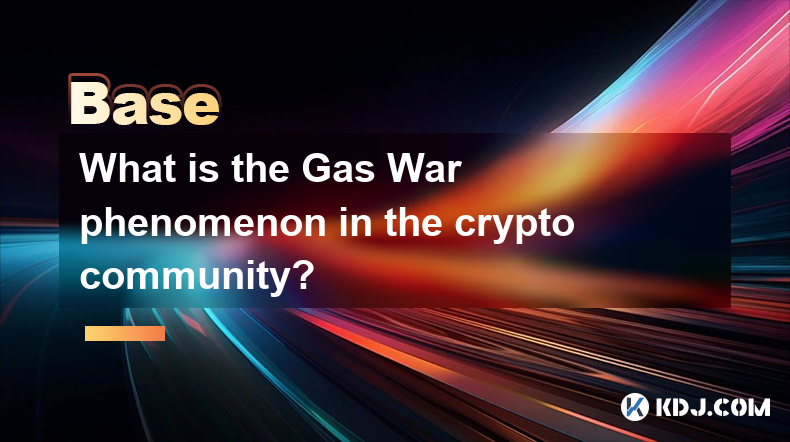
Understanding the Crypto Gas War Phenomenon
The term "Gas War" in the cryptocurrency world, specifically within Ethereum and other similar blockchain networks, refers to a situation where multiple users simultaneously attempt to execute transactions, leading to a sharp increase in transaction fees (gas fees). This surge happens because miners prioritize transactions with higher gas fees, leading to a competitive bidding process among users. The higher the gas fee offered, the faster the transaction will be processed and included in the next block.
This competitive environment can be likened to an auction. Users essentially "bid" against each other using gas fees, with the highest bidders winning. This creates a situation where gas fees can become exorbitantly high, especially during periods of high network congestion. Understanding this dynamic is crucial for navigating the complexities of blockchain transactions.
Factors Contributing to Gas Wars
Several factors contribute to the occurrence of gas wars. Firstly, high network activity is a primary driver. When many users are trying to execute transactions concurrently, demand for block space increases, forcing users to bid higher to secure their place. Secondly, popular events or launches within the cryptocurrency ecosystem often trigger gas wars. New NFT drops, initial coin offerings (ICOs), or significant protocol upgrades can generate a sudden surge in transaction volume.
Thirdly, the design of the underlying blockchain network plays a role. Ethereum, being a prominent example, utilizes a first-price auction mechanism for gas fees, making it susceptible to gas wars. Finally, the use of bots or automated systems can exacerbate the problem. These bots can rapidly place transactions with increasing gas fees, further driving up the price for ordinary users.
How to Navigate Gas Wars
Navigating gas wars requires a strategic approach. One key strategy is to monitor gas prices before initiating a transaction. Several websites and tools provide real-time gas price data, allowing users to identify periods of lower congestion and lower fees. Another crucial step is to understand your transaction's urgency. If the transaction is not time-sensitive, waiting for a period of lower gas prices can save significant costs.
- Use a gas price estimator: Many wallets and platforms offer gas price estimation tools, providing a suggested gas fee based on current network conditions.
- Set a maximum gas price: This prevents you from accidentally paying exorbitant fees if the price unexpectedly spikes.
- Consider off-peak hours: Transacting during periods of lower network activity can significantly reduce gas costs.
- Explore alternative networks: Some projects are built on alternative networks with lower transaction fees.
The Impact of Gas Wars on Users
The consequences of gas wars are significant for users. The most immediate impact is the increased cost of transactions. Users may find themselves paying substantially more than usual for simple transactions. This can discourage participation, particularly for users with smaller budgets. Furthermore, transaction delays are common during gas wars. Transactions can take significantly longer to process, causing frustration and potentially impacting time-sensitive operations.
The unpredictable nature of gas fees during gas wars can create uncertainty and risk for users. This uncertainty can make it difficult to plan budgets and manage expectations. Finally, gas wars can disproportionately affect smaller users, potentially creating a barrier to entry for newcomers to the cryptocurrency space. This could lead to a less decentralized and inclusive ecosystem.
Gas Wars and Decentralization
Gas wars raise questions about the decentralization of blockchain networks. The competitive bidding for transaction inclusion can favor users with greater resources, potentially creating a system where wealthier participants have a significant advantage. This could lead to a less equitable distribution of processing power and influence within the network. The very concept of a decentralized, permissionless system is challenged when access is significantly impacted by fluctuating and high transaction fees.
The ability of large entities or coordinated actors to manipulate gas prices through strategic bidding raises concerns about potential manipulation and the fairness of the system. This highlights the ongoing debate regarding the scalability and efficiency of current blockchain architectures and the need for solutions that mitigate the negative effects of gas wars.
Mitigation Strategies and Future Solutions
Various strategies are being explored to mitigate the effects of gas wars. Layer-2 scaling solutions, such as rollups and sidechains, aim to process transactions off the main blockchain, reducing congestion and lowering fees. Improved fee mechanisms are also being investigated, potentially incorporating more sophisticated algorithms to better distribute transaction fees and reduce volatility.
Protocol upgrades and improvements to the underlying blockchain technology are constantly being developed to enhance efficiency and scalability. These upgrades aim to increase the throughput of the network, allowing for more transactions to be processed without significantly increasing gas fees. The development and implementation of these solutions are crucial for the long-term health and usability of blockchain networks.
Gas Wars and the Future of Crypto
The phenomenon of gas wars highlights the challenges and complexities of scaling blockchain networks. While the competitive bidding system incentivizes miners and ensures transaction processing, it also creates significant challenges for users. The ongoing development and implementation of scaling solutions and improved fee mechanisms are crucial for addressing these challenges and ensuring a more user-friendly and accessible cryptocurrency ecosystem.
The future of crypto likely involves a combination of technological advancements and innovative approaches to fee management. This will be essential in creating a more sustainable and inclusive environment for all participants, regardless of their resources or technical expertise. The continued exploration and implementation of these solutions are vital for the continued growth and adoption of blockchain technology.
Frequently Asked Questions
Q: What are gas fees?
A: Gas fees are transaction fees paid to miners or validators on a blockchain network for processing transactions. They compensate for the computational resources used to validate and include the transaction in a block.
Q: Why do gas wars occur?
A: Gas wars occur due to high network congestion, often triggered by popular events or launches, leading to a competitive bidding for transaction processing.
Q: How can I avoid high gas fees during a gas war?
A: Monitor gas prices, use a gas price estimator, set a maximum gas price, consider off-peak hours, and explore alternative networks.
Q: What are the consequences of gas wars?
A: Increased transaction costs, delays, uncertainty, and potential exclusion of smaller users are the main consequences.
Q: What solutions are being developed to mitigate gas wars?
A: Layer-2 scaling solutions, improved fee mechanisms, and protocol upgrades are being developed to mitigate the effects of gas wars.
Disclaimer:info@kdj.com
The information provided is not trading advice. kdj.com does not assume any responsibility for any investments made based on the information provided in this article. Cryptocurrencies are highly volatile and it is highly recommended that you invest with caution after thorough research!
If you believe that the content used on this website infringes your copyright, please contact us immediately (info@kdj.com) and we will delete it promptly.
- XRP vs. DOGE: This Top Investor Has Made His Choice and It's Not the Memecoin
- 2025-04-04 17:30:12
- Binance Excludes PI Network from "Vote to List" Campaign
- 2025-04-04 17:30:12
- How the SEC's New Moves on Crypto ETPs Could Shape the Future of Digital Finance
- 2025-04-04 17:26:33
- MAGACOIN FINANCE Gains Traction with Early Buyers
- 2025-04-04 17:20:12
- Ryvoris Link AI Review: Cross-Exchange Trading and Straightforward Algorithm
- 2025-04-04 17:20:12
- 5 Affordable and Promising Digital Coins Gaining Ground
- 2025-04-04 17:15:11
Related knowledge
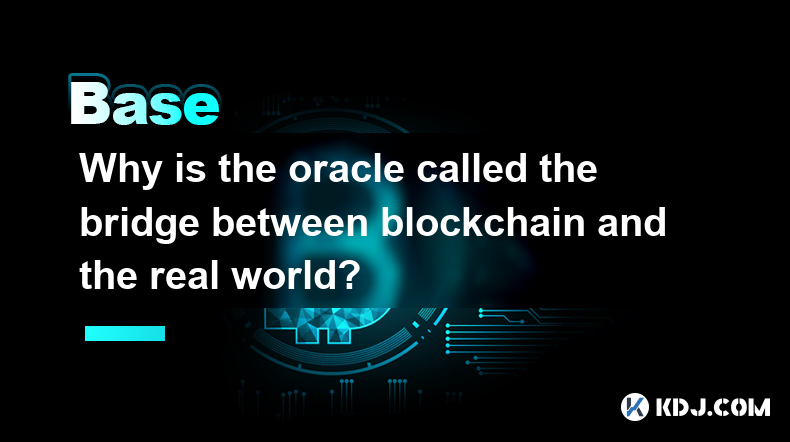
Why is the oracle called the bridge between blockchain and the real world?
Apr 04,2025 at 04:00am
The concept of an oracle in the cryptocurrency and blockchain world is crucial for understanding how these decentralized systems interact with external data. The oracle is often referred to as the bridge between blockchain and the real world because it serves as a vital intermediary that fetches, verifies, and transmits off-chain data to the on-chain en...
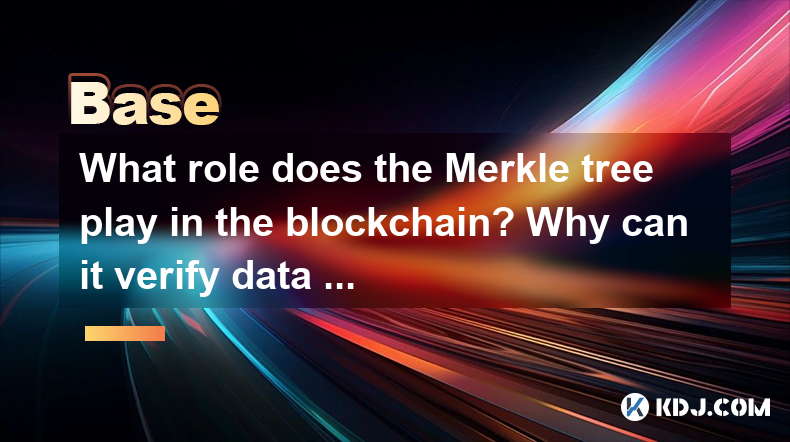
What role does the Merkle tree play in the blockchain? Why can it verify data integrity?
Apr 04,2025 at 01:29pm
The Merkle tree plays a crucial role in the blockchain, primarily due to its ability to efficiently and securely verify data integrity. This article will delve into the structure of a Merkle tree, its implementation in blockchain, and how it ensures the integrity of data. Understanding the Structure of a Merkle TreeA Merkle tree, also known as a hash tr...
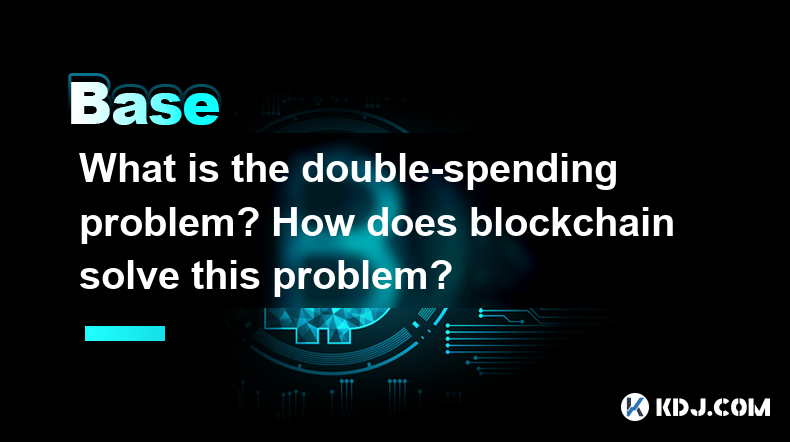
What is the double-spending problem? How does blockchain solve this problem?
Apr 04,2025 at 09:07am
The double-spending problem is a significant challenge in the realm of digital currencies. Double-spending refers to the potential for a digital currency to be spent more than once. This issue arises because digital files, unlike physical cash, can be easily duplicated. If not addressed, double-spending could undermine the integrity and trust in any dig...
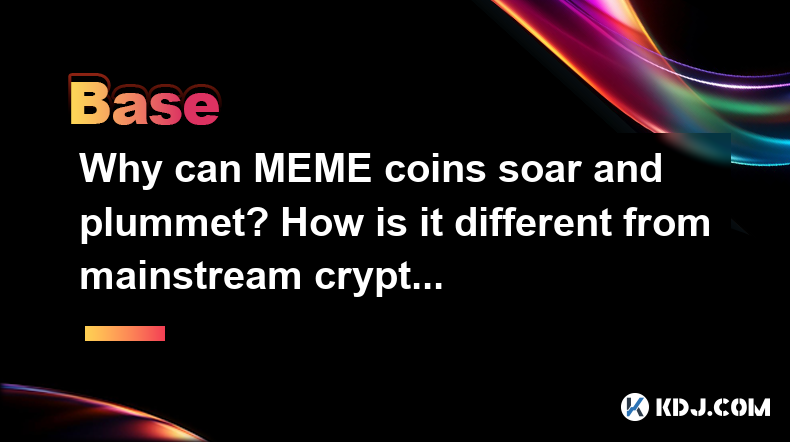
Why can MEME coins soar and plummet? How is it different from mainstream cryptocurrencies?
Apr 04,2025 at 03:07pm
The world of cryptocurrencies is vast and diverse, with a wide range of digital assets that cater to different needs and interests. Among these, MEME coins have carved out a unique niche, often experiencing dramatic price fluctuations that can both soar and plummet in a short period. This phenomenon, while intriguing, differs significantly from the beha...
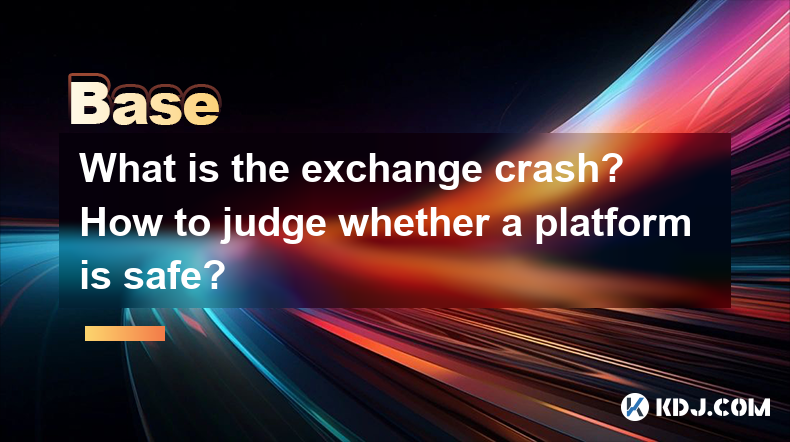
What is the exchange crash? How to judge whether a platform is safe?
Apr 04,2025 at 05:07pm
An exchange crash refers to a sudden and severe disruption in the operations of a cryptocurrency exchange platform, leading to significant financial losses for users and often resulting in the platform's inability to continue functioning. Such crashes can stem from various causes, including cybersecurity breaches, technical failures, or insolvency. Unde...
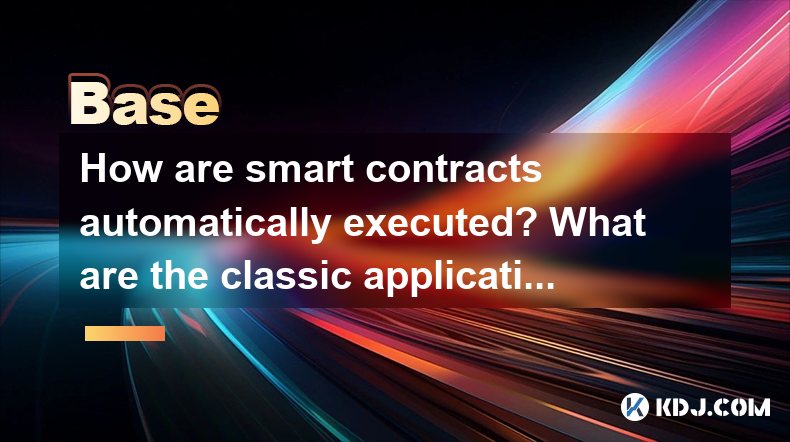
How are smart contracts automatically executed? What are the classic application scenarios?
Apr 04,2025 at 01:01pm
Smart contracts are self-executing programs stored on a blockchain that automatically carry out the terms of a contract between parties. They are designed to facilitate, verify, or enforce the negotiation or performance of a contract. The automatic execution of smart contracts is facilitated by the underlying blockchain technology, which ensures that on...

Why is the oracle called the bridge between blockchain and the real world?
Apr 04,2025 at 04:00am
The concept of an oracle in the cryptocurrency and blockchain world is crucial for understanding how these decentralized systems interact with external data. The oracle is often referred to as the bridge between blockchain and the real world because it serves as a vital intermediary that fetches, verifies, and transmits off-chain data to the on-chain en...

What role does the Merkle tree play in the blockchain? Why can it verify data integrity?
Apr 04,2025 at 01:29pm
The Merkle tree plays a crucial role in the blockchain, primarily due to its ability to efficiently and securely verify data integrity. This article will delve into the structure of a Merkle tree, its implementation in blockchain, and how it ensures the integrity of data. Understanding the Structure of a Merkle TreeA Merkle tree, also known as a hash tr...

What is the double-spending problem? How does blockchain solve this problem?
Apr 04,2025 at 09:07am
The double-spending problem is a significant challenge in the realm of digital currencies. Double-spending refers to the potential for a digital currency to be spent more than once. This issue arises because digital files, unlike physical cash, can be easily duplicated. If not addressed, double-spending could undermine the integrity and trust in any dig...

Why can MEME coins soar and plummet? How is it different from mainstream cryptocurrencies?
Apr 04,2025 at 03:07pm
The world of cryptocurrencies is vast and diverse, with a wide range of digital assets that cater to different needs and interests. Among these, MEME coins have carved out a unique niche, often experiencing dramatic price fluctuations that can both soar and plummet in a short period. This phenomenon, while intriguing, differs significantly from the beha...

What is the exchange crash? How to judge whether a platform is safe?
Apr 04,2025 at 05:07pm
An exchange crash refers to a sudden and severe disruption in the operations of a cryptocurrency exchange platform, leading to significant financial losses for users and often resulting in the platform's inability to continue functioning. Such crashes can stem from various causes, including cybersecurity breaches, technical failures, or insolvency. Unde...

How are smart contracts automatically executed? What are the classic application scenarios?
Apr 04,2025 at 01:01pm
Smart contracts are self-executing programs stored on a blockchain that automatically carry out the terms of a contract between parties. They are designed to facilitate, verify, or enforce the negotiation or performance of a contract. The automatic execution of smart contracts is facilitated by the underlying blockchain technology, which ensures that on...
See all articles




















































































